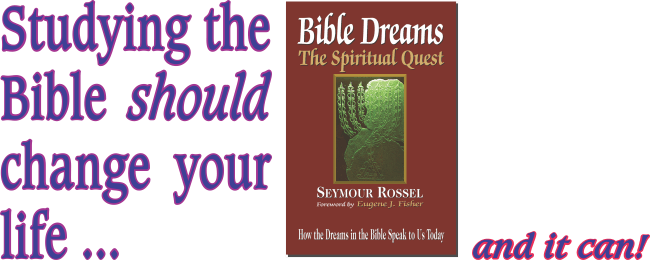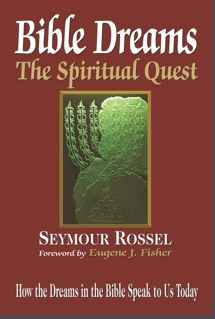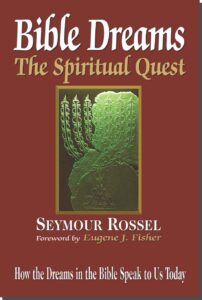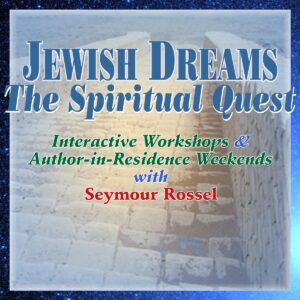Bible Dreams
Paperback, 304 pages, $15.95
ISBN-10: 0940646404
ISBN-13: 978-0940646407
Kindle / eBook, $9.99

Bible Dreams: The Spiritual Quest
How the Dreams in the Bible Speak to Us Today
• Revised Second Edition •
Seymour Rossel
Foreword by Dr. Eugene J. Fisher
U.S. Conference of Catholic Bishops
Welcome to the world of Bible Dreams: The Spiritual Quest. Discover the excitement of studying Bible, as text after text challenges us to examine our dreams, ourselves, and how we create meaning in our lives.
Explore Abraham’s mid-life crisis; the trials of separation, estrangement, death, and divorce with Jacob; the gifts of vision and prophecy with Joseph; and the potential for healing and transformation with Samuel and King Solomon.
From the sages of Talmud and Midrash to the Holodeck of Star Trek, from the visions of Elijah to the dreams of Einstein, from the ancient landscape of Shiloh and Beth El to the personal landscape of our night visions, from the technology of the ancient Greeks to the REM-sleep laboratory — Bible Dreams offers a tour de force for the modern imagination. Taking insights from anthropology, archaeology, philosophy, physics, and dream research to apply to ancient beliefs and commentary, Bible Dreams describes a practical spirituality that all of us can share.
Bible Dreams delves into the texts and contexts of the Bible’s most profound dreams and visions and discerns ways to interpret and understand our own dreams. It has been said that God reaches out to us through dreams, bringing us guidance, sustaining and nourishing our spirits, healing and refreshing us. In Bible Dreams, Rossel demonstrates the Bible’s power to reshape and transform us, especially during our most difficult and most momentous life passages.
Paperback Edition: Special Price Now!

Kindle Edition

How Dreams in the Bible Affect Human Destinies
Engagingly and informatively written by Seymour Rossel (a Reform rabbi with many years of experience giving lectures and teaching workshops on the Bible and dreams), Bible Dreams: The Spiritual Quest is a thoughtful and thought-provoking guide intended for Christians, Jews, and anyone else seeking to better understand and acquire a heightened spiritual awareness.
Individual chapters cogently address how dreams in the Bible affect human destinies, the wisdom that lies in classic scriptural parables, the potential for healing and transformation through faith, and much, much more.
A deeply spiritual outreaching, Bible Dreams: The Spiritual Quest is enthusiastically commended to the attention of non-specialist general readers with an interest in religion, spirituality, metaphysics, and the Bible.
Written by a Rabbi with a commendation from the American Roman Catholic Church … a popular exposition ….
— An Authentic Voice —
Judaism is a public religion, which encompasses personal spirituality. Religion is public, a fact of society and culture, not private or personal. Spirituality refers to attitudes, experiences, and feelings that are private and individual. Religiosity is a matter not of attitude or personal conviction, but of public activity; it is what people do together. The difference is, we can study what a group does, but only acknowledge the report concerning what an individual believes in private. What a group affirms can be examined in context, derived from the interplay of contemporary opinion and the heritage of doctrine and normative deed through the ages. What an individual professes can only be noted. Of spirituality one may use the language, “My ‘Judaism'” or “My ‘personal encounter with Christ,'” but of religion one speaks of what is shared and public: “Judaism teaches…,” “Christianity maintains…,” “Islam holds….”
The task of writing authentically on the spiritual life of Judaism (“Jewish spirituality”) is not easily accomplished, because by “spirituality” people mean many things, most of them subjective. But a number of highly gifted scholars of Judaism have created a literature of Jewish spirituality that is worthy of its task: to represent what is particular to Judaism, public and shared by us all. The names of Harold Kushner and Neil Gillman come to mind. Rabbi Kushner has transformed a personal experience into an artful and compelling “companion” to suffering. Rabbi Gillman has made theological argument into the medium for rigorous thinking about intangible attitudes and emotions. Lawrence A. Hoffman in The Journey Home: Discovering the Deep Spiritual Wisdom of the Jewish Tradition has written a classic of remarkable sensibility, and anyone who perseveres in the profound work, Kaddish, by Leon Wieseltier knows what it means to study Torah as an act of religious engagement.
In the context of writing on spirituality in the tradition of Judaism, Seymour Rossel now adds his name to that short list of authentic voices capable of speaking to the individual in behalf of the public and corporate religious world of the Torah. He writes for a broad audience of Jews and Christians, but his is a perspective shaped by Judaism. He writes with art and restraint, not relying on rhetoric to replace religious reality: encounter, authentic emotion.
His basic thesis is, “In the Bible every dream of vision is a prophecy, but every prophecy is not necessarily a dream.” He argues that “as individuals, when we record a dream, we are performing an act of creation… share our dreams with others, especially in the creativity we bring to interpreting our dreams and visions together.” So he meets head-on the challenge of subjectivity and insists that he engages in a public act. Dreams are deliberately forced to serve our waking selves. In interpreting Jacob’s dream, the sages wanted to know how it shapes the future of the people: “the Bible’s most famous dream and the interpretations placed on it by the sages provide clues for how the interpretation of dreams may ultimately shape destinies.” He expounds “paths of interpretation,” and then illustrates the journey. Abraham and Jacob “sought divine answers to moments of uncertainty and distress by initiating the dream process in a ritual way… they sent a question upward… received the inspiration and guidance they were seeking….” “If Jacob’s staircase dream dealt with estrangement, divorce, and the path to salvation, the story of Jacob’s wrestling match deals with maturity, self-image, and reintegration.”
Naturally, Joseph provides the occasion for much discussion, but in “From Scout to Seer” Rossel finds those who walked “in the footsteps of Joseph.” Having explored the dreams of Genesis, he turns to two dreams from other biblical books. He concludes with two chapters: “The Potential for Healing and Transformation,” “Out of the Dream Forest: The Meaning of the Spiritual Quest.” In these chapters he focuses on the meaning for the present of the messages contained in dreams: how we can do for ourselves what here he does for us. This is comparable to Rabbi Gillman’s essay, in his theological book, on how the faithful of Judaism can do theology for themselves — a tour de force.
What Rossel succeeds in accomplishing, therefore, is to make the most intimate and private experience, the dream, into the raw material of social culture. He has shown how to transform what is personal into what serves the public interest. This he has done through the force of intellect and the power of rigorous thought. That is why to the list of those who have met the challenge of writing books not about Judaism but of Judaism is added the name of Seymour Rossel.
…The Spiritual Life of Dreams
… Dreams capture the creative imagination because they represent … the creative side of our psyches that is unfettered by such pesky constraints as gravity, time and space. Is it a coincidence that dreams have been the linchpins of so many icons of pop culture, from The Wizard of Oz to “The Matrix” to Bobby Ewing’s miraculous resurrection on “Dallas”?
Ochs’s most recent book, The Jewish Dream Book: The Key to Opening the Inner Meaning of Your Dreams, together with Bible Dreams: The Spiritual Quest by Rabbi Seymour Rossel, show that dream interpretation is not solely the province of Hollywood screenwriters, Freudians and New-Agers but a practice that has its roots in some older Jewish traditions.
The journey into dreamland happened in very different ways for Ochs and Rossel, illuminating the differences between the two authors’ approaches. For his part, Rossel said he tapped into the vast treasure trove of biblical dream stories, from Abraham to Jacob, Joseph, Samuel and Solomon, while lecturing in his role as an adult educator for the Union for Reform Judaism. Accordingly, Rossel discusses the activity of dream interpretation as serving a public function, a way for Jewish communities and families to share deeper insights than might occur to us in waking hours. “Those dreams which are significant are meant to serve a public function,” said Rossel, who urges people to discuss their dreams on a regular basis. “If you don’t share them with us, we’re losing that kind of creativity.”
Ochs’s entree into the subject came on a more personal level, when she and her teenage daughter, Elizabeth Ochs, embarked on a study session of Brakhot. The talmudic tractate is replete with material on dream symbolism and interpretation, and the mother-daughter team began sharing thoughts and insights on a Jewish view of dreams. … [A] Jewish approach to dream interpretation connects with a larger trend in American spirituality, Ochs said. The book’s purpose, she said, is that “particularly in an age where people are seeking a greater spirituality in their private experiences, to let them know that there are spiritual traditions of dreaming that shouldn’t be forgotten.”
Dream interpretation also has a religious function, both authors assert. In ancient and biblical times, [Rossel points out] there were three major ways that God communicated with humanity: through visions, prophecies and dreams. Only dreaming is a universal experience that all Jews throughout time are guaranteed to have …. So do Jews dream Jewish dreams? Rossel thinks so. “There is a Jewish aspect to it that has to do with how you perceive your culture,” he said, “Jews will very rarely dream of a Jesus figure or a Mary figure, or dream of animal spirits as the Navajo do.” Instead, he continued, “If you’re Jewish, you dream in Jewish ways. We look for things that are informative to our community,” such as images of healing, transformation or ways of coping with life stresses, from a divorce to a midlife crisis.
We are also searching for connection with God. For example, Rossel analyzes the patriarch Jacob’s dream in which he sees a ladder full of angels stretching into the sky as a moment of reconciliation between Jacob, who had tricked both his brother Esau and his father Isaac … .Jacob, Rossel argues, was unsure of whether God would consider him worthy after his actions. In the dream, God gave Jacob the answer for which he had hoped. “It means that wherever the Jews go in the Diaspora, they’re not separate from Israel, they’re not separate from home,” Rossel said. … The assumption that we have any control over what or how we dream might be an obstacle for skeptics. That’s where Rossel and Ochs come in. [B]oth books offer techniques and practices that will help readers looking to get more out of their dreams.…

Bible Dreams: The Table of Contents
- Introduction: The Promise of Dreams
- Shattering Idols: Bible Dreams & Our Own
- Dreamwork: Using This Book
- Are We On the Right Path? Abraham’s Mid-Life Crisis
- Dream Types: Are All Dreams True?
- A Stairway to Heaven: The Sages Interpret Jacob’s Dream
- Paths of Interpretation: The Art of Seeking Meaning
- To Awaken Transformed: Jacob’s Dream of Separation & Divorce
- Preparing Yourself for Dreams and Visions: Modern & Ancient Techniques
- Coming Home: Jacob’s Dream of Reintegration
- First Fruits: Visions, Prophecy, Gifts & Landscapes
- The Interpreter: Joseph & Dreams
- From Scout to Seer: In the Footsteps of Joseph
- Dream Symbols: Samuel & Solomon Hear the Call
- Your Name Shall Be “Incredulous”: The Potential for Healing & Transformation
- Out of the Dream Forest: The Meaning of the Spiritual Quest
- Afterword to the Revised Second Edition

From the Foreword
Seymour Rossel is on to something of great importance here, both for the field of biblical scholarship and, I believe, for the spiritual life of anyone, Christian or Jew, who believes the Bible to be a sacred text capable of speaking to us from generation to generation. Why not take the dreams and visions of the biblical patriarchs and matriarchs, prophets and sages, as seriously as did the biblical authors and their intended readers? Understand them precisely as they were intended to be understood — as dreams, visions of who we are and who we might become if we but follow the dreampath beckoning not just to “them” but also, and equally, to us.
Now this is a daring vision. Most biblical scholars employ a third-person, analytical methodology that is quite sound for its intended goal of determining a given text’s original meaning within its historical context. Rabbi Rossel’s grasp of modern biblical scholarship is quite solid, and he employs it here to good use. Solid, too, is his grasp of modern psychological theory, which he also employs to useful effect. But he stops with neither of these quite laudable scientific methodologies. These cognitive results are interwoven, drawn together, challenged, and finally transcended by engagement with the ancient, medieval, and modern insights of the masters of spirituality of a variety of religious traditions, though, for obvious reasons, he relies most heavily on Jewish and Christian tradition for it is their comments, from age to age, that have kept alive the dialogue between the people of God and God’s book, the Bible.
In his innovative approach, Rossel is ironically at the same time deeply traditional, in the best sense of that term. Jews and Christians, mining the “inexhaustible riches” of the Hebrew Scriptures (to use the apt phrase of the Second Vatican Council) have from age to age affirmed that the sacred texts can have multiple meanings, ranging from the literal to the allegorical to the mystical. The “literal” (or, in Hebrew, the peshat) meaning, of course, is the historical-critical methodology mentioned above. The other possible meanings (what the rabbis would call the derash or “sought out”) in one way or another apply the text to the life of the contemporary reader, what, in essence a good preacher does in one way and a good theologian does in another.
There is a rabbinic tale which explains why so many meanings can be valid at one and the same time, and yet be so different, addressing different areas of human life: philosophical, moral, spiritual, etc. A rabbi asks his students why, when Scripture of course does not waste a single inspired word, it is said “the God of Abraham, the God of Isaac, and the God of Jacob,” when “the God of Abraham, Isaac, and Jacob” would suffice. They are baffled. “It is,” he says, “because each generation must respond to God in its own way, and so appreciate God anew in every age.”
Rossel’s unique approach, combining traditional insights and contemporary science, thus has no precise precedent in either of our traditions, rich as they are, or modern scientific biblical scholarship. Yet it has paradoxically millennia of Jewish and Christian wisdom behind it. The Bible is always best read as “practical theology,” God’s way of telling us how to live the meaning of our lives, without quite telling us how. The name Israel means, in its root, “one who wrestles with God.” Rossel’s wrestling will not tell the reader exactly how to live their lives either. But he does show a way for us, a new path that can enlighten as it challenges us to think, and to pray, in new ways, to “wrestle” with what comes to us when we rest from all cares and have only our inner selves, the small, still voice within, to listen to.
I must admit that I, like many who will pick up this book and wonder whether it is worth purchasing, began with a bit of skepticism. But this is not “grocery store spirituality” or “new age mysticism” (whatever, indeed, they are). This is the real stuff. Here, the Bible itself speaks to each of us in a way most readers will have never been aware it could address our deeper concerns, anxieties, and hopes — the deeper fears and visions that we admit to ourselves only in our dreams, when we sleep and lay ourselves open to the quiet whisperings of the Spirit of God who dwells in our hearts.
— Eugene J. Fisher, Associate Director, Secretariat for Ecumenical and Interreligious Relations, U.S. Conference of Catholic Bishops
Paperback Edition: Order Now!

Kindle Edition




